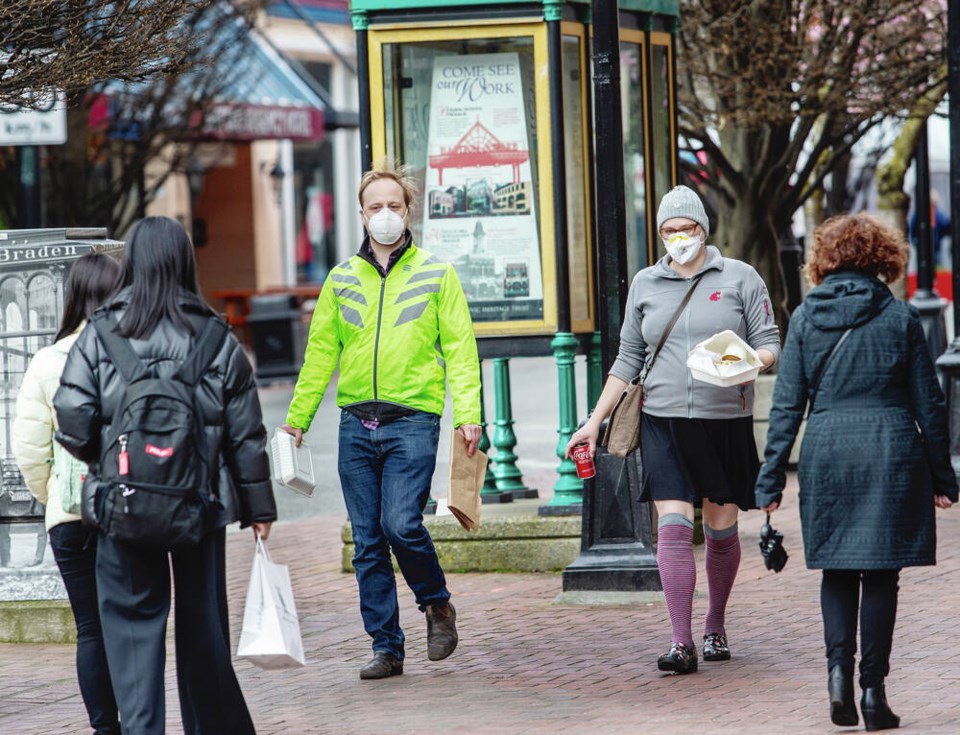B.C.’s big danger with COVID-19 is that people will forget about the virus as restrictions ease, even as new waves surge in other countries, according to infectious disease experts.
At a Canucks game this week, “every five minutes I heard someone say, ‘Thank God COVID’s gone,’ ” said Dr. Brian Conway, president and medical director of the Vancouver Infectious Disease Centre. “I think that is probably my biggest concern, is that people are thinking that way.”
B.C., he said, is likely to get a surge in new cases as restrictions are eased, but how well the disease can be kept in check will depend on how people stick to the basics — continuing to vaccinate people, washing hands, wearing masks in high-risk settings and staying home when sick.
However, even as new cases surge in the United Kingdom, the Netherlands and New Zealand, where officials fended off early waves with a zero-COVID policy, Conway doesn’t see “big red flags that are telling us we’re not doing the right thing” in B.C.
“If we’re reasonable, we will make our way through this,” Conway said.
B.C. reported seven new deaths from COVID-19 Thursday, bringing the total lives lost in the province to 2,960. Hospitalizations declined to 298, down from over 1,000 in January, with 49patients in intensive care.
However, a week after B.C. lifted a lot of restrictions related to mask-wearing indoors and capacity restrictions in private venues, people should remain wary, said modelling expert Sarah Otto.
“I think more in the sense of continuing to monitor the situation,” said Otto, a zoology professor at the University B.C. and member of the independent B.C. COVID-19 modelling team.
“We’re lucky [in B.C.] relative to places like Denmark or Hong Kong,” Otto said, in that the BA.2 version of COVID’s Omicron variant didn’t take hold here as early as it did there.
B.C.’s population built up immunity from people exposed to Omicron “on the way up to the peak as well as on the way down over the last month,” Otto said. “So that’s a lot of built-up immunity.”
Based on that, Otto said the modelling group estimated that B.C. is likely to still get another surge in cases, but it won’t be as high or as steep as the initial Omicron wave, depending on how people react to the relaxation of restrictions.
B.C. has clearly moved away from public-health mandates, Otto said, “but I do hope that masks aren’t just all of a sudden thrown away,” because they have been proven to be effective in stemming infections in indoor settings.
And masks “are probably going to make the difference between seeing, you know, another huge rise in cases or a small blip.”
Conway agreed that masks, worn strategically, need to remain part of British Columbians’ routines.
“They should make pants and skirts with mask pockets,” Conway said. “If I were in the marketing realm, which I’m not, but that’s what I would do.”
“Be mindful of your environment,” Conway said. “If everyone around you is wearing a mask, please pull out a mask, don’t ask questions.”
That is a message that has taken hold in other places that have relaxed restrictions, said infectious-disease expert Prof. Horacio Bach at the University of B.C.
Bach returned from a trip to Paris this week, where restrictions have also been eased. “But when you go to public transportation, the Metro [trains] are packed, and everyone is wearing the mask, no matter what.”
And venues such as museums and restaurants still ask for proof of vaccination, so Bach believes it is too soon for B.C. to drop its vaccine mandates on April 8.
Bach’s concern is that ready circulation of COVID infections in unvaccinated populations in parts of the world will continue generating new variants of the virus that create risks for reinfection.
Bach said researchers are learning more about how COVID infections are affecting the brains of patients, but not about how long-term those symptoms will be.
“That’s the reason preventing this disease, no matter what, is a benefit for society,” Bach said.



